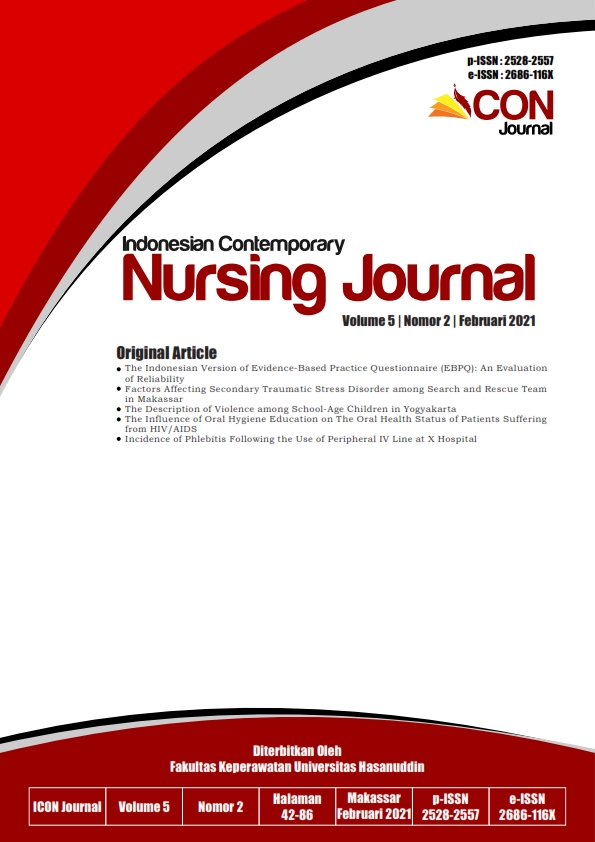Overview of Religious Activities of Students in Makassar in the Third Year of Covid-19
DOI:
https://doi.org/10.20956/icon.v7i2.24134Keywords:
religious activities, studentsAbstract
Aims: This study aims to describe the religious activities of students at a public institution
in Makassar
Methods: This descriptive survey was conducted on students who are actively registered
and willing to be respondents with a total sampling period of 30 days (26 September - 28
October 2022) (n = 1,207). Informed consent was given by the team both offline and online.
The religious activity questionnaire was given in the form of an online form while still
adhering to the ethical principles of research.
Results: The results showed that the religious activities of Muslim students for 7 religious
activities including prayer, fasting, reading the Qur'an, Islamic interpersonal relationships
(dominantly practice good morals (59.6% - 93.4%), alms (more than a half sometimes
(60.6%)), learn Islam (never = 49.9%), and remembrance and prayer activities (most widely
sometimes (35.8%-48.6%). For Christian religious activities with 3 domains, worship
activities (spiritual discipline) (91.2% follow Sunday worship and 90.4% private prayer with
main prayer, religious attitude (more than 80% always do religious attitude) and
relationships with others.
Conclusion: Students' religious activities need to be improved for wellness and happiness
because many still have not actively implemented their religious teaching. Therefore, it is
required to make an effort to increase religious activities as part of spiritual coping to
leverage the mental health welfare of students.
References
Andiarna, F., & Kusumawati, E. (2020). Pengaruh Pembelajaran Daring terhadap Stres Akademik
Mahasiswa Selama Pandemi Covid-19. Jurnal Psikologi, 16(2), 139. https://doi.org/10.24014/jp.v16i2.10395
Argaheni, N. B. (2020). Sistematik Review: Dampak Perkuliahan Daring Saat Pandemi COVID-19
Terhadap Mahasiswa Indonesia. Placentum: Jurnal Ilmiah Kesehatan Dan Aplikasinya, 8(2), 99.
https://doi.org/10.20961/placentum.v8i2.43008
Azzahra, F. (2017). Pengaruh Resiliensi Terhadap Distres Psikologis Pada Mahasiswa. Jurnal Ilmiah Psikologi Terapan, 05(01), 1?14.
Furqani, N. N. (2021). Peranan religiusitas dan kecerdasan spiritual terhadap peningkatan
kesejahteraan psikologis. Psychological Journal, 1(1), 9?15. https://doi.org/10.22219/pjsp.v1i1.16491
Napitupulu, R. M. (2020). Dampak pandemi Covid-19 terhadap kepuasan pembelajaran jarak jauh. Jurnal Inovasi Teknologi Pendidikan, 7(1), 23?33. https://doi.org/10.21831/jitp.v7i1.32771
Ratunuman, R. A., David, L. E. V., & Opod, H. (2021). Dampak Psikologis Pandemi COVID-19 Pada
Mahasiswa. Jurnal Biomedik (Jbm), 13(2), 227. https://doi.org/10.35790/jbm.13.2.2021.31836
Rohmadani, Z. V., & Setiyani, R. Y. (2019). Aktivitas religius untuk menurunkan tingkat stres
mahasiswa yang sedang skripsi. Jurnal Psikologi Terapan Dan Pendidikan, 1(2), 108.
https://doi.org/10.26555/jptp.v1i2.15135
Rusydi, A. (2012). Religiusitas dan Kesehatan mental (Studi Pada Jama?ah Tabligh Jakarta Selatan).
In Religiusitas dan Kesehatan mental (Studi Pada Jama?ah Tabligh Jakarta Selatan) (Issue
January).
Siahaan, M. (2020). Dampak Pandemi Covid-19 Terhadap Dunia Pendidikan. Jurnal Kajian Ilmiah,
(1), 73?80. https://doi.org/10.31599/jki.v1i1.265
Sukaca, A. (2017). The 9 Golden Habits for Brighter Muslim. Mizan Digital Publishing. Yogyakarta:
Bunyan
Downloads
Published
How to Cite
Issue
Section
License
Authors who publish with this journal agree to the following terms:Authors retain copyright and grant the journal right of first publication with the work simultaneously licensed under a Creative Commons Attribution License that allows others to share the work with an acknowledgement of the work's authorship and initial publication in this journal.
Authors are able to enter into separate, additional contractual arrangements for the non-exclusive distribution of the journal's published version of the work (e.g., post it to an institutional repository or publish it in a book), with an acknowledgement of its initial publication in this journal.
Authors are permitted and encouraged to post their work online (e.g., in institutional repositories or on their website) prior to and during the submission process, as it can lead to productive exchanges, as well as earlier and greater citation of published work (See The Effect of Open Access).



